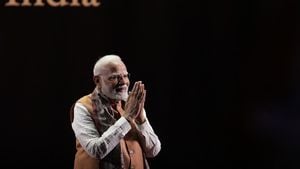Donald Trump’s triumphant return to the White House, underscored by his success at the polls on November 5, 2024, was not just another chapter for the former president but rather the beginning of what could be tumultuous waters for American politics. He claimed victory with both the Electoral College and the popular vote, but many experts have raised concerns about the actual magnitude of his win, dubbing it relatively narrow by historical standards.
Initially, Trump wasted little time singing the praises of his purported "landslide" victory before the cameras. He declared, “America has provided us with an unprecedented and powerful mandate.” Indeed, his faithful supporters echoed his sentiments, undeterred by the reality of the specific numbers. Reports indicated he secured approximately 49.9 percent of the popular vote, leading to roughly 1.6 percentage points over his opponent, Vice President Kamala Harris. This puts Trump’s victory as one of the smallest margins since the late 19th century, leaving political scientists questioning the validity of his claims of overwhelming public support.
The backdrop of his victory was not without complications. A New York state judge announced the postponement of Trump’s sentencing date for felony convictions connected to hush money payments made to adult film actress Stormy Daniels during the 2016 campaign. The postponement came after the New York District Attorney chose not to oppose Trump’s request to pause these proceedings during his term, marking another unprecedented moment where the consequences of past actions seem to overshadow presidential duties.
From the onset of his campaign, Trump’s narrative focused heavily on issues like inflation and immigration, sentiments amplified by many Americans feeling disconnected from the current political rhetoric. Trump’s narrative shifted much blame onto immigrants, often struggling to make ends meet, portraying himself as the savior against the establishment. British actor Ralph Fiennes recently commented on Trump’s innate storytelling abilities, arguing it’s what drew voters to him. "He has this remarkable gift for talking and accessing people's gut feelings," Fiennes said. “His story worked, whether you love it or hate it.”
Contrastingly, Harris seemed to struggle with her ability to connect with voters, inspiring sentiments of detachment among the electorate who might have once rallied under Democratic ideals. Many Democrats, as surveys show, are finding themselves more pessimistic about their party's future following Trump’s win. Pew Research data indicated fears loom larger among Democrats, now marking one of the lowest points of optimism for party supporters compared to the past eight years. The survey indicated nearly half—49%—of Democrats were pessimistic about their party's prospects.
With Trump’s victory has come significant pushback from Democrats fearing the path forward. The 2024 campaign saw the emergence of accusations toward Republicans of trying to disenfranchise voters. Yet, it was the lack of enthusiasm among Democratic voters, especially younger generations, leading to lost opportunities on the ground where Democrats typically enjoyed majorities.
Despite his claims of having won decisively, Trump’s margin of victory fell short when compared to significant wins over the past several decades. Historical figures such as Franklin D. Roosevelt and Lyndon B. Johnson had dominated their elections, with Johnson commanding 61.1 percent of the popular vote. For Trump, his victory feels less like the powerful mandate he’s claimed about himself and more like continued polarization within American politics, where neither side feels wholly secure.
The lack of significant down-ballot wins for Republicans also presents complications for Trump’s administration moving forward. Without the coattails of larger victory margins, many Republican candidates struggling at the polls may face challenges aligning themselves with Trump, who stands as both the party’s beacon and its lightning rod. The narrow margins for Congressional seats leave uncertainty about how readily the Republican majority will embrace Trump’s agenda moving forward.
What’s more, Trump will soon face the spectacle of dealing not just with the fallout from his judicial troubles but with balancing the interests of his party against the realities of governance. “We are focused on making America great again,” asserted Steven Cheung, the Trump campaign communications director, but whether this can translate to effective leadership remains open to debate.
Adding layers to the already complicated political narrative, former Trump aides have signaled they're ready for potential strings: Trump’s alleged returns must compete against the reality of political life after significant legal challenges, posing unique challenges to his next term. Legal experts often assert the belief long held by many—sitting presidents enjoy immunity from prosecution. This theory will be put to the test as court proceedings potentially loom large over Trump's presidency.
Meanwhile, as the political climate oscillates between disillusionment from Democrats and soaring spirits among Republicans, Trump's various maneuvers will face unprecedented scrutiny. While he may have rallied the GOP faithful, it appears the greater concern about partisan representation remains critically divided. The Pew Research survey suggests more Americans—50 percent—now feel the Republican Party genuinely reflects their interests, something of great significance since only 43 percent believe the same for Democrats.
On the international stage, Trump’s victory and policies are bound to elicit varying reactions from world leaders and influence diplomatic relationships long forged under Trump’s previous terms and following Biden's brief tenure. Many foreign leaders who were at times frustrated or confused by Trump's unpredictable nature may once again find themselves reassessing their strategies as they navigate the complex interactions with Washington during Trump’s presidency.
With the reemergence of Trump, the political climate seems set for tumultuous discussions around governance, party allegiance, and public perception heading forward. Both Democrats and Republicans must now grapple with the changing landscapes and the possible renewal of bipartisan political discourse, albeit strained. The narrative may soon transition from electoral fear to the strategies of leadership longed for by supporters bracing for the next four years under yet another Trump presidency.
Though the political narrative surrounding Trump paints him as both hero and villain, the dialogues will demand patience as the court's proceedings and public sentiment continue to shift. This range of conversations will echo across futures well beyond the 2024 election, leaving history to judge what interpretation, if any, the American public desires from this high-profile presidency. Whether he will fulfill his promise to "Make America Great Again" this time around remains to be seen, but the conversations surrounding his administration will undoubtedly remain a blend of fervor, conflict, and resentment as the party lines become ever more distinct in the years to come.



